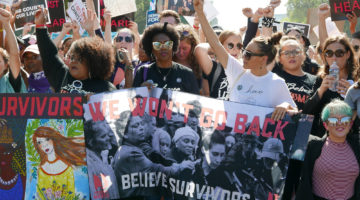For months, there have been hints and signs that the Education Department of Betsy DeVos would roll back and modify the way the federal government used Title IX to enforce how colleges and universities dealt with crimes of sexual misconduct.
During that time, DeVos had been meeting with a host of different organizations with a vested interest in the issue. They ranged from sexual assault victim advocacy groups to a men’s rights organization that’s been accused of harassing women online.
On Thursday, Sept. 7, those hints and signs became reality when DeVos announced her plan before an invitation-only audience at George Mason University. There, she said the Education Department would begin the process of “notice-and-comment,” the beginning to a months-long process that will likely end in the roll back that so many advocates for victims of sexual assault feared.
“Schools have been compelled by Washington to enforce ambiguous and incredibly broad definitions of assaults and harassment,” DeVos said. “If everything is harassment, then nothing is.”
Specifically, Devos is referencing Title IX, the 1972 law that prevents discrimination on the basis of sex. In 2011, the Obama White House issued a “Dear Colleague” letter that gave new instructions on how colleges and universities should handle matters of sexual assaults.
After the letter was issued, key questions arose immediately. For one, the letter was issued without the normal process that would make rules legally binding. This made things a bit dubious when the Obama Education Department began enforcing the rules as if they were law, using the newly-created Office of Civil Rights to push institutions of higher education to do more about sexual assault.
On the one hand, the new rules provided a necessary outlet for justice for victims of sexual assault. For years prior, it could be extremely difficult — if not nearly impossible — for some victims to get justice via the traditional court systems. These new rules often lowered evidence standards (for instance, the University of Nevada, Reno, uses a “preponderance of evidence” standard, which is lower than the traditional criminal standard of “beyond a reasonable doubt”).
The move was extremely controversial, and many — including respected legal scholars — have called the rules overbroad and too punitive for those who might be falsely accused.
Perhaps this is true, but it is also true that for years, victims of sexual assault have been marginalized in the eyes of the law. Look no further than Nevada’s backlog of some 8,000 untested rape kits for easy evidence.
At colleges and universities, the problem was often even more pronounced. The outrage driven by the issue of sexual assault didn’t come out of nowhere, and the fact that one in five women will be sexually assaulted during their time at college must not be overlooked.
So sure, Betsy DeVos, revise the rules. It’s certainly valid that the “Dear Colleague” letter can’t (and probably shouldn’t) pass legal muster. But in the process, the rights of the victim, which have only so recently come to the fore, can’t be tossed out with the bathwater.












